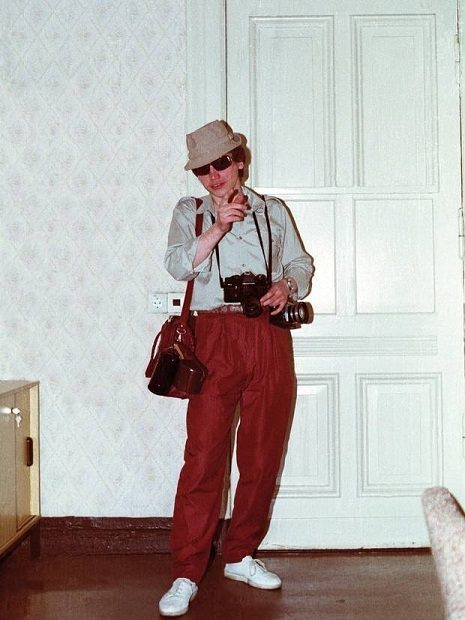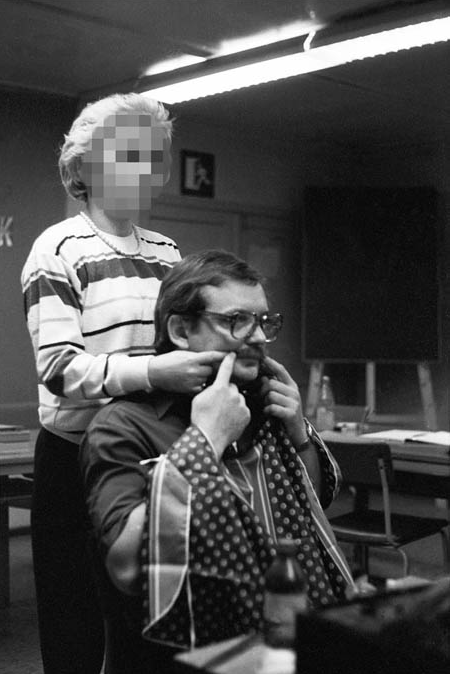Amazon Deals
New at Amazon
Saturday, February 27, 2016
Friday, February 26, 2016
Friday links
Is Margarine Dead?
Snacks and serendipity: How the microwave was invented by accident.
This is very cool to watch: The Chemistry of Matches, in Super Slow Motion.
Snacks and serendipity: How the microwave was invented by accident.
This is very cool to watch: The Chemistry of Matches, in Super Slow Motion.
13 classic video games you can play right now in your web browser.
The next generation of Boston Dynamics’ Atlas robot is here, and it's approaching Terminator Genisys-like appearance.
ICYMI, Thursday's links are here, and include calculating how long would it take for a single person to fill up an entire swimming pool with their own saliva, real-life technologies inspired by video games, a human-sounding Dorito-eating goat (with bonus goat-related links), and 10 of history's most famous prostitutes.
Thursday, February 25, 2016
Fashion Advice from a 1980s East German Stasi disguise seminar
The pictures below are from official papers examined by author Simon Menner in the course of research for his book, Top Secret: Images from the Stasi Archives, and are now housed at the Stasi Archives. Documents included a dress code for undercover agents, since they were supposed to blend in and look like everybody else. From the book's synopsis at Amazon:
Almost 300,000 people worked for the STASI (wiki), the East German secret police--per capita, far more than are or were employed by agencies such as the CIA or the Soviet Union's KGB. Once top secret, and now preposterous, these images are both comical and sinister.Flashbak has more numbers:
In 1989, 91,015 comrades worked directly for the Stasi (short for Staatssicherheitsdienst, or State Security Service), East Germany’s not-so-secret secret police (1950-1990). That’s from a population – and let’s be precise here – of 16,586,490. To keep the people watched at all times, the Stasi employed a further 173,081 part-time informants. In East Germany it was reasonable to assume you were being watched, your movements held on file.At its apogee, the Stasi had a staff three times that of the Gestapo. “They offered incentives, made it clear people should cooperate, recruited informal helpers to infiltrate the entire society,” says Konrad Jarausch, of University of North Carolina. “They beat people up less often, sure, but they psychologically trampled people.”
The Chemistry of Matches, in Super Slow Motion
My perspective on chemistry has changed quite a bit since the dry, impenetrable subject I was forced to take it in high school and college, largely because of this sort of well-made video.
The American Chemical Society produced the original of this slow motion video last year, and has now taken this footage (shot at 4,000 frames per second) and added an explanation of the sequence of chemical reactions that take place at the molecular level when a match is struck.
From youtube channel Reactions:
To fire up the grill or the gas stove, we often reach for a match. It turns out there’s a lot of chemistry going on to make those little wooden wonders work. The best way to find out about the chemistry of burning matches is to watch it in ultra-slow motion.
 |
| Click here to embiggen |
Lots more on the history of matches at Compound Interest.
via Gizmodo.
Thursday links
Watch (and listen to) this goat eating Doritos, with bonus goat links.
How long would it take for a single person to fill up an entire swimming pool with their own saliva?
Finalists from Smithsonian’s Annual Photo Contest - and you can vote for the Readers Choice awards.
How Many Nobel Prizes Could Sir Isaac Newton Win?
ICYMI, Monday's links are here, and include a video tour of the Museum of Bad Art, the unexpected math behind Van Gogh's "Starry Night", $8.4 million for Michelangelo’s Tuscan villa, how not to get killed by a cow (and the Brit farmer who turned Nazi super cows into sausage because they were too aggressive, and Picasso’s self portraits from age 15 to age 90.
Labels:
goats,
Links,
Newton,
nobel prize,
photos,
prostitutes,
video games,
what if
Wednesday, February 24, 2016
Finalists from Smithsonian’s Annual Photo Contest announced - vote for Readers Choice awards.
Smithsonian has just announced the 70 finalists for their 13th annual photo contest and voting is now open from now until March 21, 2016 for the Readers’ Choice Winner. The Grand Prize, Readers’ Choice, and seven category winners (a total of nine awards) will be announced on March 22, and the 14th Annual Photo Contest will open for submissions that same day.
A selection is below, but go to the Smithsonian site to see all of the finalists - this same link has the winners of each previous year.
 |
| © Albert Ivan Damanik. All rights reserved |
Remaining on the Slopes of Mount Sinabung
Volcanic material flows from the Mount Sinabung, as seen from the village of Jeraya, North Sumatra, Indonesia on June 26, 2015. Indonesia's Mount Sinabung Mount intermittently spewed burning ash and gas, a week after authorities told residents to evacuate the danger zone within a radius of seven kilometers.
 |
| © Simone Sbaraglia. All rights reserved |
This photograph was taken in January 2015 on Lake Kerkini, Greece. The dalmatian pelicans that inhabit that area have grown accustomed to humans since fishermen have fed them for hundreds of years. Their presence helps maintain a balanced ecosystem.
 |
| © ARCHNA SINGH. All rights reserved |
Muscle Power
These two sub-adult tiger cubs, aged around 21 months, are engaged in a mock fight, a part of their learning process to acquire stalking and self-defense skills. Taking advantage of the fact that a sibling’s attention was diverted for a moment, the other charged her and what was witnessed was a sheer moment of awe when these beautiful and magnificent animals were standing upright just for a moment and you could see the rippling muscles and the power that these biggest cats hold. No more than a few seconds and it was all over where one of the siblings is seen lying down in a submissive position – a pose that tells the opponent that the rival has surrendered. Definitely a rare moment to be captured in the wild, these playful lessons that the siblings engage in are a crucial learning lesson for their adult life.
After evening rain and a foggy morning, the sun rose over the autumn plain, and three black cows appeared through the mist.
 |
| © Ricardo Cisneros. All rights reserved |
Wildebeest Leap
This photograph was taken in Kenya at the Maasai Mara reserve during the annual wildebeest migration.
 |
| © Tuan Nguyen Manh. All rights reserved. |
The fishermen are tossing the net under the sunset.
Previous post: Finalists for the 2012 Smithsonian Magazine Photo Contest
Watch (and listen to) this goat eating Doritos, with bonus goat links
He/she/it actually sounds rather human:
And, because no post about goats is complete without it, here's the supercut of goats yelling like humans (Turn the sound down but not off):
Related links:
Here are goats singing the US national anthem.
Apparently "Goat Arousal Expert" is a real job.
Obama admin's new goatherder regulations to assist foreign workers who fill goat herding positions in the U.S.
Game of Goats, A Yelling Goats Version of the ‘Game of Thrones’ Theme Song.
Goat eating Doritos via Joanne Casey
Tuesday, February 23, 2016
The 1945 assault on Iwo Jima started Feb 19; the flag raising was on Feb 23: quotes, history, and a documentary
The cave-digging may be futile. The stand on Iwo may be futile. The whole war may be futile. But would you give up then? If our children can safely live for one more day, it'll be worth one more day that we defend this island.
~ General Tadamichi Kuribayashi (1923-1945) (to his troops defending Iwo Jima)
From those who fought there:
We were confronted with defenses being built for years. There were complex, subterranean levels, some two stories down. From these the defenders could approach the enemy on the surface virtually anywhere through warrens. spider holes, caves, and crevices.
~ Captain (later General) Fred Haynes
I'd known combat in the Solomons with its sly ambushes and jungle firefights, but Iwo was another kind of war. On Iwo by the eighth day, only two officers of my second battalion were standing ... We had one prisoner - unconscious, his clothes blown off.
~ Colonel Thomas M. Fields
I left some good friends there. It was a battle with no front line - all man-to-man, inch by inch.
~ Corporal Robert Hall
The enemy was nowhere and everywhere, especially at night. All around you, talking, moving. Only hand grenades you trusted, one after another.
~ Private First Class George Gentile
 |
| A U.S. 37 mm (1.5 in) gun fires against Japanese cave positions in the north face of Mount Suribachi |
February 19 is the anniversary of the amphibious assault by the United States Marines on Japanese-held Iwo Jima (wiki) in 1945, during the final year of World War II. Located in the Volcano Islands, 750 miles south of Tokyo, Iwo Jima was one of the final steps in Admiral Nimitz's Central Pacific "island-hopping" campaign and was attacked both to eliminate a base from which Japanese fighter aircraft could intercept Tinian-based U.S. B-29 bombers on bombing raids against Japan and to provide those bombers the protection of U.S. fighter escorts based there, plus an emergency landing site.*
After several days of naval bombardment, the initial landing involved 30,000 men of the 3rd, 4th, and 5th Marine Divisions, and eventually 60,000 Marines were involved. The island was defended by 22,000 Japanese troops, heavily dug in. One of the key objectives was Mount Suribachi, a 554-foot peak at the southwest end of the island, and after some of the fiercest fighting of the Pacific war, it was secured on the 5th day, when photographer Joe Rosenthal took his iconic picture of the Iwo Jima flag-raising.
Nonetheless, Japanese resistance on the rest of the island remained formidable, and Iwo Jima was not declared completely taken until 26 March.** Virtually all of the Japanese defenders were killed or committed ritual suicide. American casualties totaled more that 6,800 dead and 19,000 wounded. Within six more months - following the capture of Okinawa and the atomic bombing of Hiroshima and Nagasaki, the war was over. General James L. Jones, 32nd Commandant of the Marine Corps, later said,
"The valor and sacrifice of the Marines and Sailors who fought on Iwo Jima is, today and forever, the standard by which we judge what we are and what we might become."
* N.B. In view of the horrendous casualties suffered on Iwo Jima, some authorities - ex post facto - have questioned this rationale. Iwo-based Japanese fighters had little earlier effect on the U.S. bombing campaign, and in the event, only ten bombing missions were flown later under the protection of Iwo-based American fighters. Moreover, relatively few subsequent real in-flight emergencies required bombers to land at Iwo Jima.
** A number of Japanese soldiers refused to surrender and hid out on the island until well after the war was over. The last two gave up on 6 January 1949.
This 9 minute documentary with rare color footage is well worth the time:
Iwo Jima vet James Scotella recounts raising of American flag:
Based on Ed's Quotation of the Day, only available via email. If you'd like to be added to his list, leave your email address in the comments.
Monday, February 22, 2016
Monday links
A video tour of the (excellent) Museum of Bad Art.
The Canary Girls and the WWI Poisons that turned them Yellow.
The unexpected math behind Van Gogh's "Starry Night".
Got an extra $8.4 million? Michelangelo’s Tuscan is Villa For Sale.
Picasso’s Self Portrait Evolution From Age 15 To Age 90.
Picasso’s Self Portrait Evolution From Age 15 To Age 90.
ICYMI, Friday's links are here, and include interestingly-translated Chinese restaurant menus, where dogs come from, a 1960s Russian turbojet train, and a free coloring book of weird patents.
A video tour of the (excellent) Museum of Bad Art
MOBA has a website with more bad art than you could ever possibly want to see. They also have a book available: The Museum of Bad Art: Masterworks, which, it seems to me, would be an excellent gift.
Here are a few from the portraiture collection, including the painting that inspired the collection - Lucy in the Sky With Flowers (backstory here):
Sunday, February 21, 2016
Man arrested in The Netherlands for wearing a pink fleece pig hat
Gates of Vienna: In the PowNed news video below, you’ll see a man being arrested at a PEGIDA (wiki) protest in The Netherlands for wearing a silly pig hat.
The translator includes this summary of what happened:
There is a protest with hardly a Mohammedan in sight. One of the protesters wears a funny hat, in the shape of a pig. This hat does not cover his face in any way. Much less than a headscarf (or worse) does. Therefore the police have no legal reason to ask him to remove this hat. Nevertheless they do. Their reason? In order not to offend Mohammedans.
Many thanks to H. Numan for the translation, and to Vlad Tepes for the subtitling:
My reaction to this was to immediately order a pig hat of my own.
Subscribe to:
Comments (Atom)



















